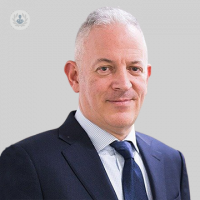What are the main signs of haemorrhoids?
Written in association with:Haemorrhoids is the latest topic of discussion here in this article below, as renowned and award-winning consultant colorectal and general surgeon, Professor Richard Cohen, provides us with an incredibly informative guide with regards to the development of haemorrhoids.

What are the signs of haemorrhoids, and how do they feel different from other problems around the bottom?
People tend to have different perceptions of what haemorrhoids are actually. To patients, haemorrhoids means anything that affects their back passage, be it bleeding, discomfort, or swelling. To us surgeons, they are cushions of tissue which are covered by skin and lined with the lining of the bowel that can cause mischief.
The main symptoms of haemorrhoids are bleeding and the presence of a lump. They tend to feel very uncomfortable. If a patient experiences pain when they open their bowels, they are more likely to have anal fissures.
You can just have internal haemorrhoids, which presents as bright red blood in the stool or when a patient wipes their bottom. Haemorrhoids that just bleed may not be any cause for concern once the patient has been checked for bowel cancer and this has been ruled out. Simple measures such as increasing water intake and fibre in your diet will make the bowel softer which will result in less aggravation on the bowel.
If bleeding from haemorrhoids is quite substantial and frequent, patients will require further treatment.
How do doctors treat haemorrhoids, and how will they decide what's best for me?
For small haemorrhoids, there are some doctors that use elastic bands to throttle the haemorrhoids off. This is a very quick and painless procedure. For larger haemorrhoids that prolapse and need to be pushed back in after going to the toilet, the finest treatment is a haemorrhoidectomy.
This involves cutting them off. Patients will be asleep for the procedure. I reserve this operation for patients who are deeply troubled by their haemorrhoids. Placing a suture under the artery that feeds the haemorrhoids via ultrasound guidance has recently become available is now a highly effective procedure for treating them.
Another treatment procedure for haemorrhoids that has become available recently is a procedure called Rafaelo. Finally, then, a staple haemorrhoidectomy is another treatment option and one which I’ve been doing for years.
Can things like diet or sitting habits make my haemorrhoids feel better?
Sitting habits probably won’t make any difference to your haemorrhoids worse. In terms of diet, it is thought that constipation can contribute to the development of haemorrhoids.
When should I see a doctor about my haemorrhoids?
Any patient who notices bleeding from their back passage should seek medical attention.
If you’d like to make an appointment today with Professor Richard Cohen, just head on over now to his Top Doctors profile.


